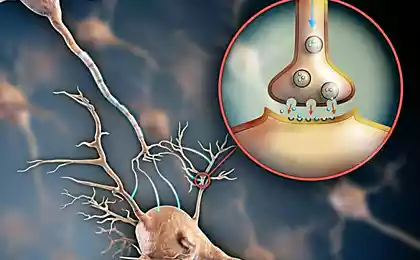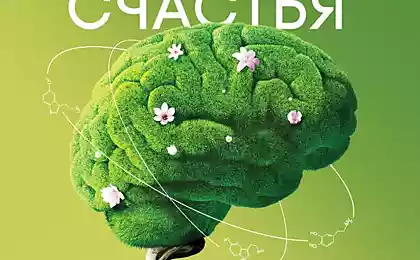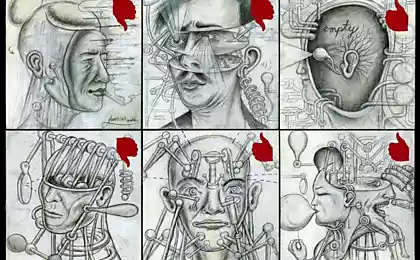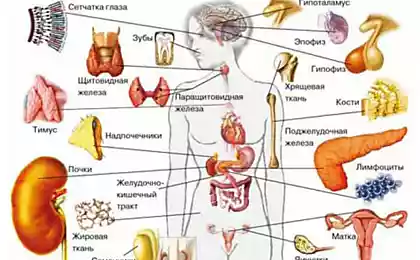1500
Serotonin syndrome: IMPORTANT information about your health
Serotonin is often called the "happiness hormone", it is produced in the body in times of ecstasy, its level rises during the euphoria and decreases during the depression.
But along with the most important task is to give us a good mood, it performs in the body has a lot of functions.
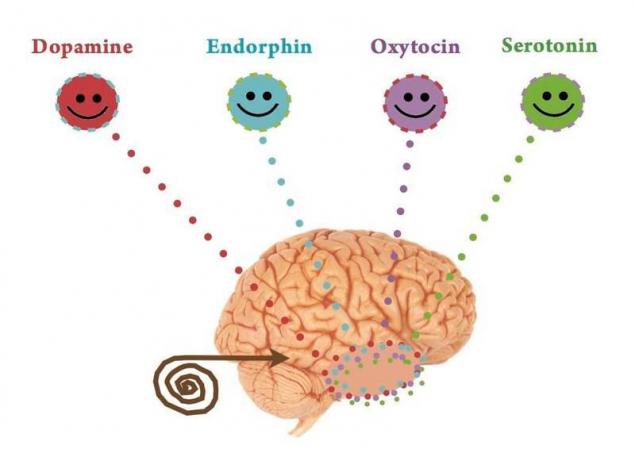
WHAT IS SEROTONIN?
Serotonin is a chemical transmitter impulses between nerve cells. Although this substance is produced in the brain, where it performs its primary function, approximately 95 % of serotonin is synthesized in the gastrointestinal tract and in platelets. In the body constantly circulates up to 10 mg of serotonin.
Serotonin relates to biogenic amines, metabolism similar to the metabolism of catecholamines. He is involved in the regulation of memory, sleep, behavioral and emotional reactions, blood pressure monitoring, thermoregulation, and food reactions. Formed by dopamine and serotonin neurons, epiphysis, and enterochromaffin cells of the gastrointestinal tract.
95% of the serotonin in the human body is localized in the intestine, is a major source of blood serotonin.
In the blood it is found predominantly in platelets that capture the serotonin from plasma.
HOW IS THE SEROTONIN IN THE BRAIN?
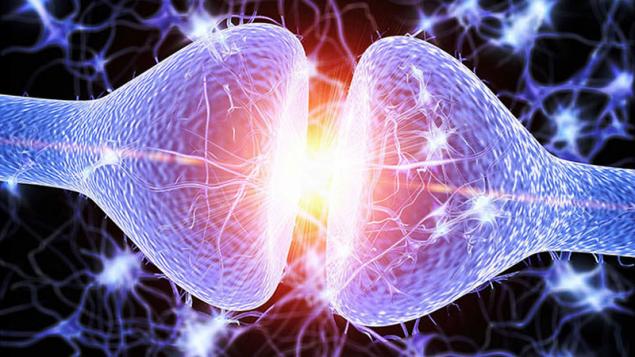
It is known that serotonin levels through the roof in moments of happiness and falls during the depression. 5-10% of serotonin is synthesized by the pineal gland from the essential amino acid tryptophan. For its production is absolutely necessary sunlight, therefore on Sunny days our mood at altitude. The same process may explain the well-known winter depression.
WHAT ROLE SEROTONIN PLAYS IN OUR HEALTH?
Serotonin helps transmit information from one brain area to another. In addition, it affects a lot psychological and other processes in the body. From 80-90 billion cells in the brain serotonin has a direct or indirect impact on most of them. It affects the cells that are responsible for mood, sexual desire and function, appetite, sleep, memory and learning ability, temperature and some aspects of social behavior.
It is proved that the decrease of serotonin increases the sensitivity of the pain system of the body, that is, even the weakest comments irritation severe pain.
Serotonin can also affect the functioning of the cardiovascular, endocrine systems and muscle function.
Studies have shown that serotonin may play a role in the formation of breast milk, and its deficiency may be the cause of sudden death in infants during sleep.
Serotonin and normalizes blood clotting. In patients with tendency to bleeding the amount of serotonin is reduced. The introduction of serotonin helps to reduce bleeding.
Serotonin stimulates the smooth muscles of blood vessels, Airways, intestines. While increases intestinal peristalsis, reduce the daily amount of urine, narrowing of the bronchioles (branching bronchi). Lack of serotonin can cause intestinal obstruction.
An excess of the hormone serotonin in the regulatory structures of the brain depressing the functions of the reproductive system.
Serotonin is involved in the pathogenesis of diseases of the gastrointestinal tract, in particular carcinoid syndrome and irritable bowel syndrome. Determination of the concentration of serotonin in blood in clinical practice used primarily in the diagnosis of carcinoid tumors of the abdominal cavity (the test is positive in 45% of cases of carcinoid of the rectum). The study of blood serotonin it is advisable to use in combination with the determination of the excretion of the serotonin metabolite (5-HIAA) in the urine.
WHAT IS THE CONNECTION BETWEEN SEROTONIN AND DEPRESSION?

A person's mood depends largely on the amount of serotonin in the body. Of the serotonin produced by the brain, but however, quite a large part of it is produced by the intestines.
It is possible that a deficit of serotonin in the intestines and determines the development of depression. And the lack of it in the brain — only a consequence, an accompanying symptom.
Moreover, this phenomenon may explain the side effect from the use of the most common remedies for the treatment of depression. It is often used antidepressants (inhibitors of serotonin reuptake) and operate on the intestines, causing nausea and digestive disorders.
A shortage of serotonin increases the pain threshold of sensitivity, causes impaired intestinal motility (IBS — irritable bowel syndrome, constipation and diarrhea), secretion of stomach and duodenum (chronic gastritis and ulcers). The lack serotina affects the metabolism of beneficial microflora of the colon, inhibiting it.
In addition of intestinal dysbiosis, a lack of serotonin in the body can be, and all other diseases of the digestive system, leading to poor assimilation of food needed by the body substances, such as tryptophan.
It is likely that the root cause of depression lies in the low number of brain cells responsible for serotonin production and the lack of receptors able to receive serotonin produced. Or blame deficiency of tryptophan, an essential amino acid that makes up serotonin. If there is at least one of these problems, there is a greater likelihood of depression and obsessive-compulsive neurological disorders: anxiety, panic and bouts of unreasoning anger.
At the same time, while certainly not known, the deficiency of serotonin causes depression or depression causes serotonin levels to drop.
SEROTONIN SYNDROME — a pathological condition associated with excessive secretion of serotonin.
Is called a multiplying the contents in the brain of serotonin of antidepressants, especially in combination with drugs that enhance the action of serotonin (a monoamine oxidase inhibitors, drugs lithium, agonists of dopamine receptors, etc.).
Clinically manifested by anxiety, confusion, accompanied by movement disorders (myoclonia, tremor, increased muscle tone, ataxia) and autonomic disorders (low grade fever, nausea, diarrhea, headache, flushing of the face, chills, profuse sweating, rapid breathing and pulse, fluctuations in blood pressure, dilated pupils). In severe cases, possible high fever, seizures, opisthotonos, disseminated intravascular coagulation, myoglobinuria, renal failure, coma.
Also interesting: the Hormone of happiness: EVERYTHING You didn't know about the serotonin
Hormonal balance: 5 natural ways to fight for happy hormones
S. S. usually resolves on its own within a few hours or days after discontinuation of the drug serotoninomimetics. However, cases with fatal outcome. Treatment mainly involves symptomatic measures. Serotonin antagonists (e.g., methysergide, cyproheptadine), a beta-adrenergic blocking agents contribute to a more rapid regression of symptoms.published
Author: Liudmila Kuzmenko
P. S. And remember, only by changing their consumption — together we change the world! ©
Source: osteo.zp.ua/%D1%81%D0%B5%D1%80%D0%BE%D1%82%D0%BE%D0%BD%D0%B8%D0%BD-%D0%B8-%D1%81%D0%B5%D1%80%D0%BE%D1%82%D0%BE%D0%BD%D0%B8%D0%BD%D0%BE%D0%B2%D1%8B%D0%B9-%D1%81%D0%B8%D0%BD%D0%B4%D1%80%D0%BE%D0%BC-%D0%B2%D0%B0/
But along with the most important task is to give us a good mood, it performs in the body has a lot of functions.

WHAT IS SEROTONIN?
Serotonin is a chemical transmitter impulses between nerve cells. Although this substance is produced in the brain, where it performs its primary function, approximately 95 % of serotonin is synthesized in the gastrointestinal tract and in platelets. In the body constantly circulates up to 10 mg of serotonin.
Serotonin relates to biogenic amines, metabolism similar to the metabolism of catecholamines. He is involved in the regulation of memory, sleep, behavioral and emotional reactions, blood pressure monitoring, thermoregulation, and food reactions. Formed by dopamine and serotonin neurons, epiphysis, and enterochromaffin cells of the gastrointestinal tract.
95% of the serotonin in the human body is localized in the intestine, is a major source of blood serotonin.
In the blood it is found predominantly in platelets that capture the serotonin from plasma.
HOW IS THE SEROTONIN IN THE BRAIN?

It is known that serotonin levels through the roof in moments of happiness and falls during the depression. 5-10% of serotonin is synthesized by the pineal gland from the essential amino acid tryptophan. For its production is absolutely necessary sunlight, therefore on Sunny days our mood at altitude. The same process may explain the well-known winter depression.
WHAT ROLE SEROTONIN PLAYS IN OUR HEALTH?
Serotonin helps transmit information from one brain area to another. In addition, it affects a lot psychological and other processes in the body. From 80-90 billion cells in the brain serotonin has a direct or indirect impact on most of them. It affects the cells that are responsible for mood, sexual desire and function, appetite, sleep, memory and learning ability, temperature and some aspects of social behavior.
It is proved that the decrease of serotonin increases the sensitivity of the pain system of the body, that is, even the weakest comments irritation severe pain.
Serotonin can also affect the functioning of the cardiovascular, endocrine systems and muscle function.
Studies have shown that serotonin may play a role in the formation of breast milk, and its deficiency may be the cause of sudden death in infants during sleep.
Serotonin and normalizes blood clotting. In patients with tendency to bleeding the amount of serotonin is reduced. The introduction of serotonin helps to reduce bleeding.
Serotonin stimulates the smooth muscles of blood vessels, Airways, intestines. While increases intestinal peristalsis, reduce the daily amount of urine, narrowing of the bronchioles (branching bronchi). Lack of serotonin can cause intestinal obstruction.
An excess of the hormone serotonin in the regulatory structures of the brain depressing the functions of the reproductive system.
Serotonin is involved in the pathogenesis of diseases of the gastrointestinal tract, in particular carcinoid syndrome and irritable bowel syndrome. Determination of the concentration of serotonin in blood in clinical practice used primarily in the diagnosis of carcinoid tumors of the abdominal cavity (the test is positive in 45% of cases of carcinoid of the rectum). The study of blood serotonin it is advisable to use in combination with the determination of the excretion of the serotonin metabolite (5-HIAA) in the urine.
WHAT IS THE CONNECTION BETWEEN SEROTONIN AND DEPRESSION?

A person's mood depends largely on the amount of serotonin in the body. Of the serotonin produced by the brain, but however, quite a large part of it is produced by the intestines.
It is possible that a deficit of serotonin in the intestines and determines the development of depression. And the lack of it in the brain — only a consequence, an accompanying symptom.
Moreover, this phenomenon may explain the side effect from the use of the most common remedies for the treatment of depression. It is often used antidepressants (inhibitors of serotonin reuptake) and operate on the intestines, causing nausea and digestive disorders.
A shortage of serotonin increases the pain threshold of sensitivity, causes impaired intestinal motility (IBS — irritable bowel syndrome, constipation and diarrhea), secretion of stomach and duodenum (chronic gastritis and ulcers). The lack serotina affects the metabolism of beneficial microflora of the colon, inhibiting it.
In addition of intestinal dysbiosis, a lack of serotonin in the body can be, and all other diseases of the digestive system, leading to poor assimilation of food needed by the body substances, such as tryptophan.
It is likely that the root cause of depression lies in the low number of brain cells responsible for serotonin production and the lack of receptors able to receive serotonin produced. Or blame deficiency of tryptophan, an essential amino acid that makes up serotonin. If there is at least one of these problems, there is a greater likelihood of depression and obsessive-compulsive neurological disorders: anxiety, panic and bouts of unreasoning anger.
At the same time, while certainly not known, the deficiency of serotonin causes depression or depression causes serotonin levels to drop.
SEROTONIN SYNDROME — a pathological condition associated with excessive secretion of serotonin.
Is called a multiplying the contents in the brain of serotonin of antidepressants, especially in combination with drugs that enhance the action of serotonin (a monoamine oxidase inhibitors, drugs lithium, agonists of dopamine receptors, etc.).
Clinically manifested by anxiety, confusion, accompanied by movement disorders (myoclonia, tremor, increased muscle tone, ataxia) and autonomic disorders (low grade fever, nausea, diarrhea, headache, flushing of the face, chills, profuse sweating, rapid breathing and pulse, fluctuations in blood pressure, dilated pupils). In severe cases, possible high fever, seizures, opisthotonos, disseminated intravascular coagulation, myoglobinuria, renal failure, coma.
Also interesting: the Hormone of happiness: EVERYTHING You didn't know about the serotonin
Hormonal balance: 5 natural ways to fight for happy hormones
S. S. usually resolves on its own within a few hours or days after discontinuation of the drug serotoninomimetics. However, cases with fatal outcome. Treatment mainly involves symptomatic measures. Serotonin antagonists (e.g., methysergide, cyproheptadine), a beta-adrenergic blocking agents contribute to a more rapid regression of symptoms.published
Author: Liudmila Kuzmenko
P. S. And remember, only by changing their consumption — together we change the world! ©
Source: osteo.zp.ua/%D1%81%D0%B5%D1%80%D0%BE%D1%82%D0%BE%D0%BD%D0%B8%D0%BD-%D0%B8-%D1%81%D0%B5%D1%80%D0%BE%D1%82%D0%BE%D0%BD%D0%B8%D0%BD%D0%BE%D0%B2%D1%8B%D0%B9-%D1%81%D0%B8%D0%BD%D0%B4%D1%80%D0%BE%D0%BC-%D0%B2%D0%B0/
Unique exercise prevent diseases of the reproductive organs: practice is EVERYTHING!
What comes first: Belief or Compulsion?



















